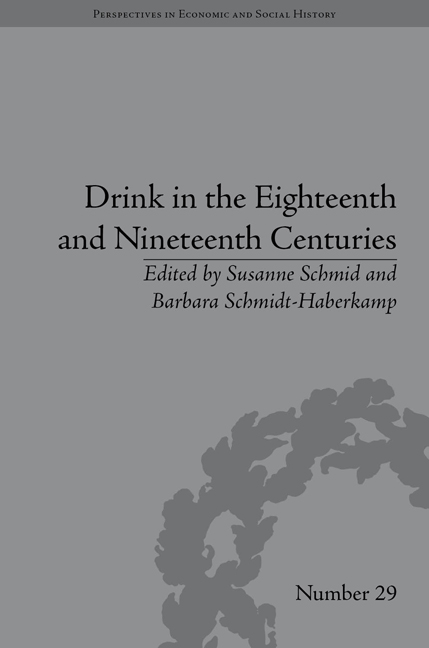Book contents
- Frontmatter
- CONTENTS
- Acknowledgements
- List of Contributors
- List of Figures and Tables
- Introduction
- Part I Ritual and Material Culture
- Part II Institutions and Social Class
- Part III Temperance and the Misery of Alcohol
- 7 Romantic Radicalism and the Temperance Movement
- 8 The Myth of ‘Misery Alcoholism’ in Early Industrial England: The Example of Manchester
- Part IV Intoxication and Therapy
- Part V Case Studies: Rum, Cocoa and Magical Potions
- Notes
- Index
7 - Romantic Radicalism and the Temperance Movement
from Part III - Temperance and the Misery of Alcohol
- Frontmatter
- CONTENTS
- Acknowledgements
- List of Contributors
- List of Figures and Tables
- Introduction
- Part I Ritual and Material Culture
- Part II Institutions and Social Class
- Part III Temperance and the Misery of Alcohol
- 7 Romantic Radicalism and the Temperance Movement
- 8 The Myth of ‘Misery Alcoholism’ in Early Industrial England: The Example of Manchester
- Part IV Intoxication and Therapy
- Part V Case Studies: Rum, Cocoa and Magical Potions
- Notes
- Index
Summary
Any reader of nineteenth-century novels, from Elizabeth Gaskell's Mary Barton (1848) to Emile Zola's L'Assommoir (1877), will be well aware of the literary probing into the causes of alcoholism among the poor. Self-indulgence, nervous disorders and social or genetic dispositions were among the explanations produced at the time. Nineteenth-century literature teems with representations both of drunkenness and of temperance campaigns with a religious or medical motivation, culminating in the teetotalism campaign for abstinence not only from spirits, but from alcohol in general. In the age of gin palaces in the great industrial cities, temperance tracts and cheap repository tracts for the poor were legion. In earlier centuries, discoveries and conjectures in philosophy, medicine and science were published both in prose and poetry, and literati and psychologists explored new fields such as the unconscious simultaneously. In the words of the Radical temperance advocate Erasmus Darwin, pioneering doctor of medicine, innovative scientist and advocate of a change of the radix (root) of the feudal structure of society, it was thought beneficent ‘to inlist Imagination under the banner of Science’. Hence, the fiction, poetry, diaries, letters, periodicals, sermons, tracts and medical treatises that deal with the consumption of various kinds of alcohol, interwoven as they often were with national and colonial discourses, must be brought into dialogue.
- Type
- Chapter
- Information
- Drink in the Eighteenth and Nineteenth Centuries , pp. 81 - 90Publisher: Pickering & ChattoFirst published in: 2014



